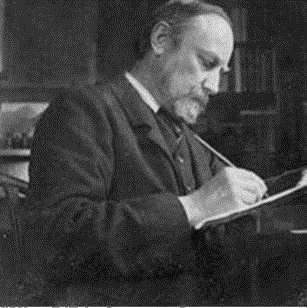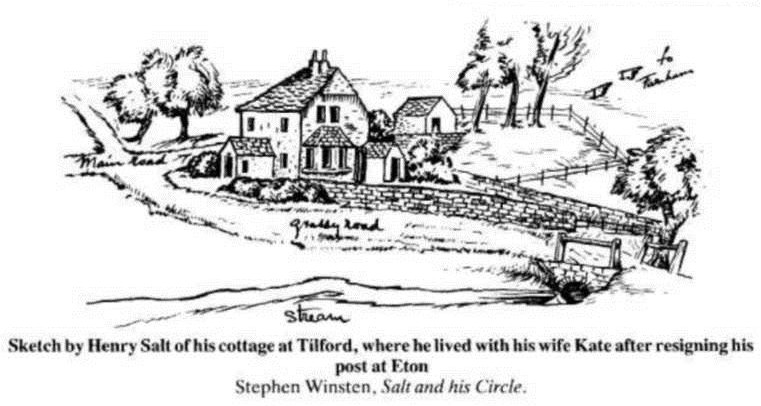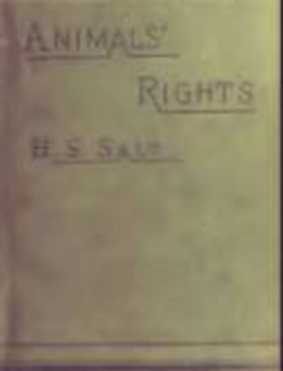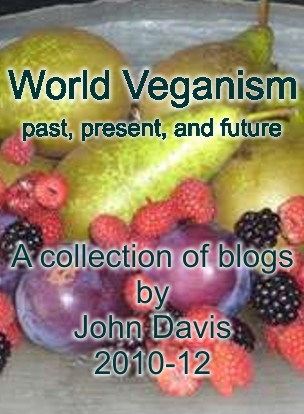January 11,2012
 Henry Salt died in 1939, age 88, five years before the invention of the word 'vegan', but for his last 55 years he clearly and consistently promoted animals' rights, and what we now call ethical veganism.
Henry Salt died in 1939, age 88, five years before the invention of the word 'vegan', but for his last 55 years he clearly and consistently promoted animals' rights, and what we now call ethical veganism.
He wrote almost forty books, mostly on veg-related topics which paved the way for the movement we know today - including his groundbreaking: Animals' Rights, considered in Relation to Social Progress, of 1894.
He was also a significant influence on Mahatma Gandhi, and his biographies of Shelley and Thoreau raised awareness of aspects of their lives which had been wilfully neglected by the meat-eating writers of his day.
In 1884, age 33, Salt was a master at Eton College, the most prestigious school in Britain, at the height of the British Empire (Princes William and Harry both went there more recently). But that year he and his wife, Kate, dropped out and moved to a country cottage where they grew their own vegetables and he started writing.
One of his first articles was an essay 'A Plea for Vegetarianism'. It is not clear where this was initially published, but in 1886 the (ovo-lacto) Vegetarian Society published a collection of Salt's essays, with that one as the book title. In a much later book he quoted part of his original essay, which he said included: "...even dairy produce is quite unnecessary, and will doubtless be dispensed with altogether under a more natural system of diet." That section was missing from the 1886 edition.
 In 1890 the young Mohandas K. Gandhi, then a law student in London, picked up Salt's book, and many years later he wrote in his autobiography that he had made a slightly reluctant vow to his mother not to eat meat whilst away but: "I read Salt's book from cover to cover and was very much impressed by it. From the date of reading this book, I may claim to have become a vegetarian by choice."
In 1890 the young Mohandas K. Gandhi, then a law student in London, picked up Salt's book, and many years later he wrote in his autobiography that he had made a slightly reluctant vow to his mother not to eat meat whilst away but: "I read Salt's book from cover to cover and was very much impressed by it. From the date of reading this book, I may claim to have become a vegetarian by choice."
Gandhi also read Salt's biography of Henry David Thoreau, which led on to reading Thoreau essay 'On Civil Disobedience', which also made a lasting impact. In 1891 the London Vegetarian Society held farewell dinner as Gandhi was returning to India. Henry Salt was there too, but it would be 40 year before they met again.
That same year Salt founded the Humanitarian League, which campaigned for the rights of underprivileged humans as well as all the animals. This led on to perhaps his most significant work: Animals' Rights, considered in Relation to Social Progress, published in 1894.
The book covered every aspect of the use of animals by humans, with chapters on: The Principle of Animals' Rights The Case of Domestic Animals The Case of Wild Animals The Slaughter of Animals for Food Sport, or Amateur Butchery
Murderous Millinery [feathered hats were popular then] Experimental Torture Lines of Reform
 The phrase 'animal rights' had existed for many years, but had been used in connection with animal welfare laws. There had been others, most notably Lewis Gompertz in 1824, who had argued whether humans should make any use of other animals at all. Henry Salt brought the two together, using the phrase 'animal rights' for an overall view that, whilst incomplete, was distinct from mere welfare reforms.
The phrase 'animal rights' had existed for many years, but had been used in connection with animal welfare laws. There had been others, most notably Lewis Gompertz in 1824, who had argued whether humans should make any use of other animals at all. Henry Salt brought the two together, using the phrase 'animal rights' for an overall view that, whilst incomplete, was distinct from mere welfare reforms.
Many modern vegans are surprised to find that in Salt's chapter on 'animals as food', he makes no mention at all of eggs or dairy products, restricting himself to slaughter and just avoiding the wider issue completely. But we do have to remember that this was 1894, most of his potential readers were ovo-lacto-vegetarians, and most of his publicity would be via the Vegetarian Societies. If he alienated them he would have had almost no readers at all. The editing of his 1886 essay by the Vegetarian Society had already demonstrated that.
Salt consistently took the pragmatic approach of the acceptance of eggs/dairy as a 'first step'. His later book, The Logic of Vegetarianism' in 1906, consisted of dialogues between vegetarians and various meat-eating characters. Naturally the vegetarians easily won all the arguments - until the last section where 'Mr. Consistency' debates the use of eggs/dairy with the Vegetarian.
By this time Salt was a Vice-President of the Vegetarian Society, and gave the standard arguments of why the word 'vegetarian' included those things that were obviously not vegetation, but added no personal comment of his own. Most readers would be left thinking that Mr. Consistency got the better of the argument...
He continued actively writing until the first world war intervened, he was 63 in 1914, and the debate about the use of all animal products had become much more open by that time. He produced more books after the war, but the conflict had decimated the vegetarian movement in Europe and it would not be until the late 1960s that it began a slow return to the earlier levels of popularity.
Meanwhile, in 1931, the now world famous Gandhi came back to London for talks with the British Government about Indian independence. Whilst he was there he gave a talk for the London Vegetarian Society, with Henry Salt, now 80, on his right hand side. During his talk, on The Moral Basis of Vegetarianism, Gandhi described his use of (goat's) milk as 'the tragedy of my life'. A few years later the Vegan Society was founded.
Henry Salt was a major figure in the vegetarian movement of the late 19th and early 20th centuries, but it took many years before a wider animal rights movement emerged in the late 1960s. In 1975 Peter Singer took up the challenge in his 'Animal Liberation', and in the preface said of Henry Salt: "... a new generation... discovered that it had all been said before".
 John Davis
John Davis
